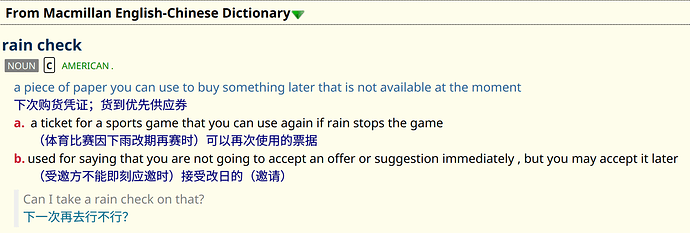原谅包含着对对方的接受,有重归于好的倾向。
算了包含着衡量自己得失决定不追究不麻烦的信息,是不折腾不再见的累的放弃。
上面的忽略和宽恕也类似,某些地方重合了信息,共同信息是略过,不再关注。
但一个可能是对方发生了不应该的错误我愿意容忍给对方机会改正,我脾气好的不再关注,放在心上这件事。
另一个可能是对方只是小缺点,算不上错误,所以我不再斤斤计较鸡蛋里面挑骨头用完美无缺的神的标准来看待对方从而不再关注,是理应的对合理的缺点的忽略,认可,或浅浅地倾向不是重点的小问题的不再计较。
类似这种复杂信息的有共同信息元素的,在语言上用一个词语来模糊灵机的表达处理多种可能的信息集合的表达方法在很多词上任意的引申随意的发挥着,形成了群体的习惯的力量再倒逼新生儿强行认可。
既然宽恕和忽略的共同部分是把注视的眼光、目光从上越过,跳过,略过的overlook,理所应当是其本意!而不是更多信息的我是宽恕的略过还是不放心上你做的合理还行的忽略的略过,又或是没好好注意错失的略过。。。我只是简单的overlook了呀!
更多类似现象
最近看到一个词组rain check,本义就是下雨耽误了比赛,会有一张雨票,这样再次比赛可以用来看比赛。
这里面就有很多可能的信息了,鬼知道用的哪个。但是词典没有记录的这个票是观众买的还是比赛赔的?这些信息不清楚,这词组就没法理解也没法使用表达。因为它可以是任意用法,但别人理解,大多数人偏好另一种用法,那就无法沟通了。
那么take a rain check可能是提前买的带保险的票,万一下雨了也能日后补赛时用;与之对应的平价票则是比赛中断了那盈亏自负下场比赛下次买?
那是哪一种可能呢?从观众上帝的价值观看应该是赔付的票证,那么这个票又能代表啥含义。take a rain check ? 我拿到了一张雨票。是表示自己倒霉没看成比赛这个信息?还是表示美好的东西没得到只有未来的承诺焦急担忧惶恐这个信息?还是表示虽然失去了但是也得到未来承诺的安慰和平衡这个信息?
结果上面可能的意思都不是,竟然用来表示改天,等等这个信息。
并且基于此,延伸出2个场景
-
促销产品卖的很快没货了,你大老远来买,为了不让你白跑一趟,我好心发你个票,给你许诺,同样的低价,改天来买。
-
你发了一个请求,我说下次一定!!实际是拒绝,改天吧,我不是不想,而是时间不合适。。。。
这2个释义,只利用了雨票的改天的信息,就直接全拿过来代替,那其他信息呢,凭啥不用?被动,扫兴,许诺,爱的球赛,期待?这么多可能的信息,只用“改天”这一个信息!
以上2个释义是看了十几个词典后才总结出来的,有的词典会误导你,不解释,或让你更迷惑,因为各种不通,各种理解都可以。所以一定要读好书。
下面是对比。
-
MW-U, ODE, OED
-
MW-ALD, LODE加一分。
这两个意思都是改天等等为基础,又各自加了私有的意思,前者是promise, 后者是refuse 。因为前者的场景自带out of stock,没有人refuse 顾客,后者则是自己要refuse.就跟b站的下次一定一样。。只是一种拒绝。。。可是这雨难道不是天灾,还能是你想拿张雨票就改天还是你说了算了?这明明是自己不想看,而想下次看或者下次也不看,应该叫改签,退票!!而不是雨票!!若是允诺对方,也应该是give you a rain check,允诺对方,你改日再问我,我一定答应你,这他喵的我自己能拿一张雨票吗?所以成了我拿了雨票我不得不观看?而不是你给我雨票你会改日履行你的责任?所以强行理解就是,你问我,但是我想下次再说,所以我会像拿着雨票一样,咱们下次再谈说不定可以?????所以这个意思和雨票不同的信息那么多,但唯独因为有下次以后这个信息,就变成了这种用法???忽略了前置的种种特性,唯独使用延迟到下次这个信息。韦氏牛逼,翻译出来之所以是我take a rain check 就是说想延迟这种优惠特权的兑换,也就是看待整个雨票又从另一个角度,即不是我运气不好比赛中断,也不是比赛举办方给我的未来承诺的赔偿,而是我可以兑换这个权利的角度,那不还是改签的角度吗!这种主动的改签跟被动的换个日子通知你看比赛能是一样吗?比赛都被雨破坏了,竟然还能把得到雨票变成一种福利优惠的延长这么引申?我也真是服了美国人的英语思维了。是真的乐观,看来棒球是真的喜爱,天气延后也是福利。韦氏牛逼韦氏牛逼,竟然把美国英语思维都给我点明了,难怪以我的角度看怎么都不是个这个角度看整个事件。韦氏又举了另一个例子Who smiles, confers a rain check to an untoward hour. 牛逼啊,只要不是我take a rain check 而是给别人了,瞬间我又变成赛事举办方了,于是这个比喻的点还是延期,只不过延期的是厄运的到来,终于思维和我一致了。。。
所以这个rain check 整个事件各种信息在引申发散的时候,自己拿雨票是福利的延期最终会兑换,有福利,是好事,虽然是拒绝,但只是因为时机,而非不喜欢。而给别人雨票则是福利竟然延期兑换了,竟然延期了,是坏事。美国英语好双标啊。在自己身上就是还有半瓶水,同样的词到了别人身上不是别人还有半瓶水,而是别人怎么半瓶空气!真双标。没有一点世界人民大团结的气概。
各词典对比
OXFORD ALD 10解释出基本意思,但是我不知道为什么基本意思和词有什么联系,为什么是这个意思。
OED 全有,不过我理解时有歧义。。2条混乱。。
ODE 全有,有一条不知为何。比OED更清楚。。
朗文美语多了一条解释,本应该夸,但有残缺关键信息导致无法理解这个票有啥用。把
a piece of paper which allows you to buy a particular product at a special price, given by a store when it does not have any more of the product
要是朗文把 a special price 改成 the same low price 就好了
cambridge ALD 也是3个意思选了两条详解,不过解的很清楚明白。第三个释义其实有,不过没有显示,得特地补全了再搜。。。或者用cambridge online 进行跳转。。。。
MWU很好,但是顶了同样名的MW ALD 2个释义拉跨。。再次出现问题就不看你释义了!还是要分开看,例句还不错,不能删。。。MW Online 反而更准确。。就是金子也多,噪音也多。
collins online 中的websterNewWorld还不错
collins ALD 一般
MacMillan, 表现和LONGMAN AMERICAN 一样差。。中文更惨。。译成牛马了。真是比我还随意的想像词的意思,可是你是专业编词典的啊!
在义项1中重点在于延期,改日,不在于下次、优先,我下次来就优先给我了?;在3中也不是接受改日,以后去看不看比赛是权利,非义务,非许诺。。而现在此刻就要拒绝,以后再说,重点在延。
random house 还好
THE FREE DICTIONARY 噪音也是多,从哪里拼的很多内容。。有部分抄的AHD…
AHD 还好。。
WIKTIONARY 绝了,我以为少了一个解释,结果它把原始义项放到了词源ORIGIN 部分。。
稍复杂点的单词,包括了多一点的信息背景,ESL词典就受限于篇幅讲的不清。。
通过实体的某方面特点引申为局部属性进而代表等到改日行不行。这么用听起来比较新鲜灵活,这种用法不应该作为词收录,而应作为修辞手法进行学习。这叫象征还是啥
其他词
apple of one’s eye
第一, 怎么才能在各个词典中搜到这个? apple of my eye? apple of somebody’s eye? apple? eye?
每个词典都要试不同的ID才能搜到 。。。。累人。。
我眼(object)的苹果(section)? 这个section到底是眼里倒映的苹果图像,还是瞳孔?引申为珍贵。
到底是我眼珠子的眼仁还是我脑海人生字典中香甜可口充饥当口粮过生日才能吃到的的面包黄油之上的苹果,还是我此刻饥肠辘辘眼睛中倒影,盯着的苹果,这种急切的生动的场面。
结果一查ode,竟然是表达黑眼珠子。。你是我的黑眼珠子!!!
